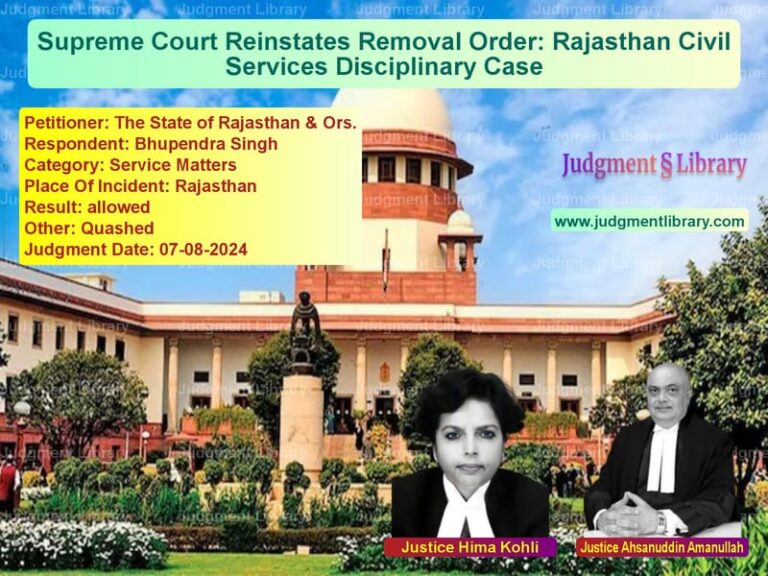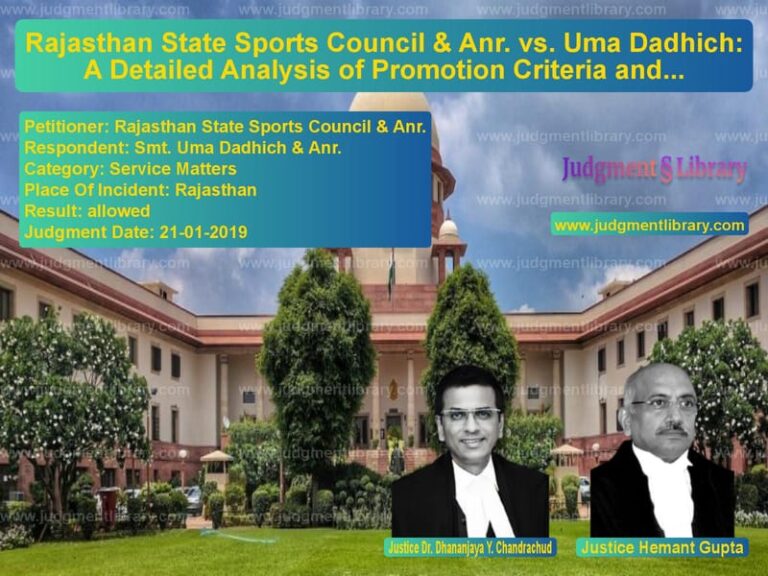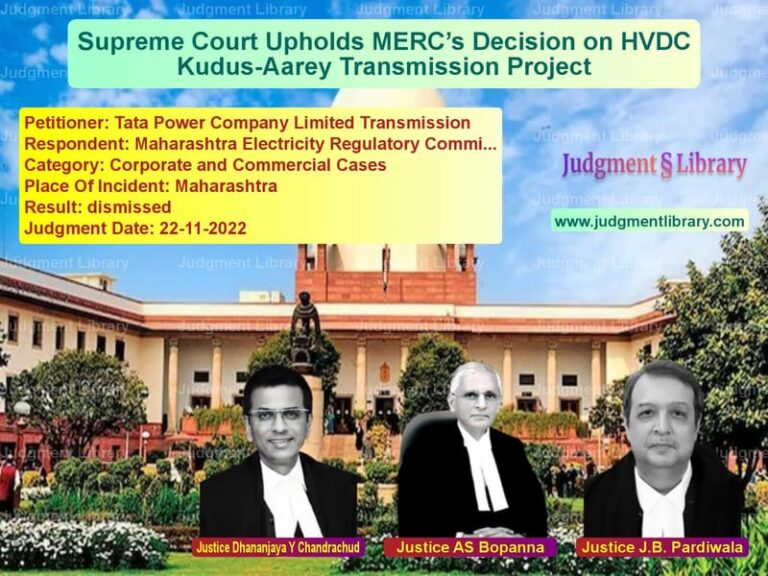Supreme Court Ruling on NDPS Act: Compliance with Section 52A and Its Legal Impact
The Supreme Court of India, in Bharat Aambale v. State of Chhattisgarh, delivered a significant ruling on compliance with Section 52A of the Narcotic Drugs and Psychotropic Substances Act, 1985 (NDPS Act). The case revolved around the validity of a conviction based on procedural lapses in handling seized contraband and whether such lapses warranted acquittal.
Background of the Case
The appellant, Bharat Aambale, was convicted under Section 20(b)(ii)(C) of the NDPS Act for possession of 120 kg of cannabis. The trial court sentenced him to 15 years of rigorous imprisonment along with a fine of ₹1 lakh. The High Court of Chhattisgarh upheld the conviction, prompting the appellant to approach the Supreme Court, arguing that non-compliance with Section 52A rendered his conviction unlawful.
Key Facts
- The appellant was arrested on the charge of possessing a commercial quantity of cannabis.
- The seizure was conducted by the local police, and the contraband was stored without a magistrate’s certification.
- The trial court convicted him based on the chemical analysis of the seized samples.
- The High Court upheld the conviction despite procedural irregularities in the disposal of the contraband.
- The appellant argued that failure to comply with Section 52A violated his legal rights and should lead to acquittal.
Legal Issues
Petitioner’s Arguments
The appellant contended that:
- The prosecution failed to comply with Section 52A, which mandates that a magistrate must certify the inventory of seized drugs before disposal.
- The contraband was destroyed without proper certification, raising doubts about its authenticity.
- Several legal precedents have held that non-compliance with procedural safeguards can vitiate the entire prosecution case.
- The conviction was based on unverified evidence, violating principles of fair trial and due process.
Respondent’s Arguments
The State of Chhattisgarh countered that:
- The seizure, storage, and disposal of the contraband were conducted as per established guidelines.
- Minor procedural lapses do not automatically lead to acquittal if the prosecution establishes guilt beyond a reasonable doubt.
- The appellant’s guilt was confirmed by the forensic report, witness testimonies, and circumstantial evidence.
- The NDPS Act aims to curb drug trafficking, and strict compliance with procedural requirements should not override the broader objectives of the law.
Supreme Court’s Observations
1. Importance of Compliance with Section 52A
The Court analyzed the legislative intent behind Section 52A and its relevance in preventing tampering of seized substances.
- “The certification by a magistrate ensures that the seized contraband is properly accounted for and not manipulated.”
- “Any deviation from this statutory requirement must be critically examined to prevent miscarriage of justice.”
2. Impact of Procedural Lapses
The Court acknowledged that while procedural safeguards are crucial, their violation does not always invalidate a conviction.
- “A procedural lapse does not automatically mean acquittal unless it directly impacts the fairness of the trial.”
- “The evidentiary value of seized materials must be assessed holistically rather than mechanically applying technicalities.”
3. Examination of Evidence
The Court scrutinized the reliability of the evidence presented by the prosecution.
- “The forensic analysis of the samples confirmed the presence of narcotic substances, supporting the trial court’s findings.”
- “The testimony of investigating officers and independent witnesses remained consistent, lending credibility to the seizure process.”
Key Precedents Cited
- Noor Aga v. State of Punjab – Emphasized that procedural non-compliance could vitiate conviction if it prejudices the accused.
- Union of India v. Bal Mukund – Held that strict compliance with NDPS procedures is necessary to prevent wrongful conviction.
- Mangilal v. State of Madhya Pradesh – Reinforced the requirement of magistrate certification under Section 52A.
Final Judgment
- The Supreme Court dismissed the appeal and upheld the conviction.
- The Court ruled that procedural lapses did not significantly affect the fairness of the trial.
- However, the Court directed authorities to ensure stricter compliance with Section 52A in future cases.
Implications of the Judgment
This ruling has significant implications for NDPS Act enforcement:
- Reaffirms the importance of procedural safeguards in narcotics cases.
- Establishes that procedural lapses do not automatically lead to acquittal.
- Encourages authorities to adopt best practices in handling seized contraband.
- Ensures that justice is served while maintaining legal safeguards.
The judgment strengthens the prosecution’s ability to enforce drug laws while safeguarding the rights of the accused.
Petitioner Name: Bharat Aambale.Respondent Name: State of Chhattisgarh.Judgment By: Justice J.B. Pardiwala, Justice R. Mahadevan.Place Of Incident: Chhattisgarh.Judgment Date: 06-01-2025.
Don’t miss out on the full details! Download the complete judgment in PDF format below and gain valuable insights instantly!
Download Judgment: bharat-aambale-vs-state-of-chhattisgar-supreme-court-of-india-judgment-dated-06-01-2025.pdf
Directly Download Judgment: Directly download this Judgment
See all petitions in Drug Possession Cases
See all petitions in Bail and Anticipatory Bail
See all petitions in Judgment by J.B. Pardiwala
See all petitions in Judgment by R. Mahadevan
See all petitions in dismissed
See all petitions in supreme court of India judgments January 2025
See all petitions in 2025 judgments
See all posts in Criminal Cases Category
See all allowed petitions in Criminal Cases Category
See all Dismissed petitions in Criminal Cases Category
See all partially allowed petitions in Criminal Cases Category







